Table of Contents
When Pain is Chronic Yet ‘Invisible’
Physical pain is no laughing matter, that’s for sure. When we mention the word ‘pain’, the type of pain that often comes to mind first is that of a physical nature. In fact, unbearable physical pain that becomes chronic is a major contributing factor to suicide risk.
For people who live with chronic pain, this seeps into all facets of their life like a slow poison. It disables one function after another, switches off mental and emotional connections, and corrupts all the rules of life.
Many of these disabilities are ‘invisible’, which leads to societal stigmas. Humans are highly visual creatures after all. How do you empathise with pain that’s internal and therefore, unseen to the naked eye?
Even family members can have trouble grasping the depth and complexity of chronic pain, and they’re often the people who are closest to us. What more about colleagues, acquaintances, and worse yet – strangers?
Pin to your Chronic Illness & Quotes Boards:
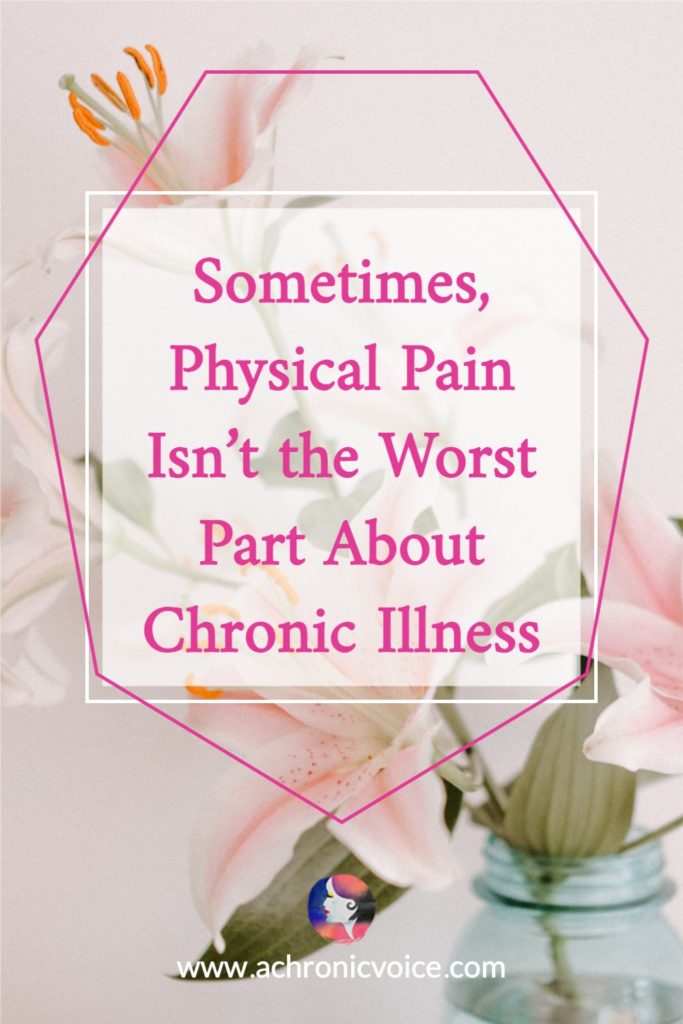
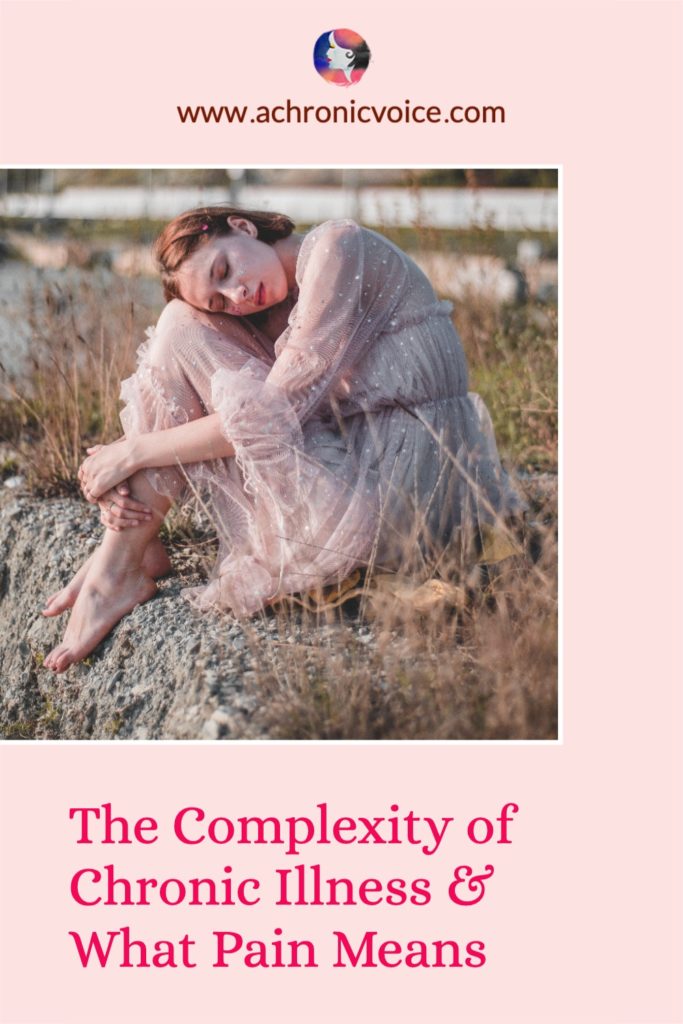
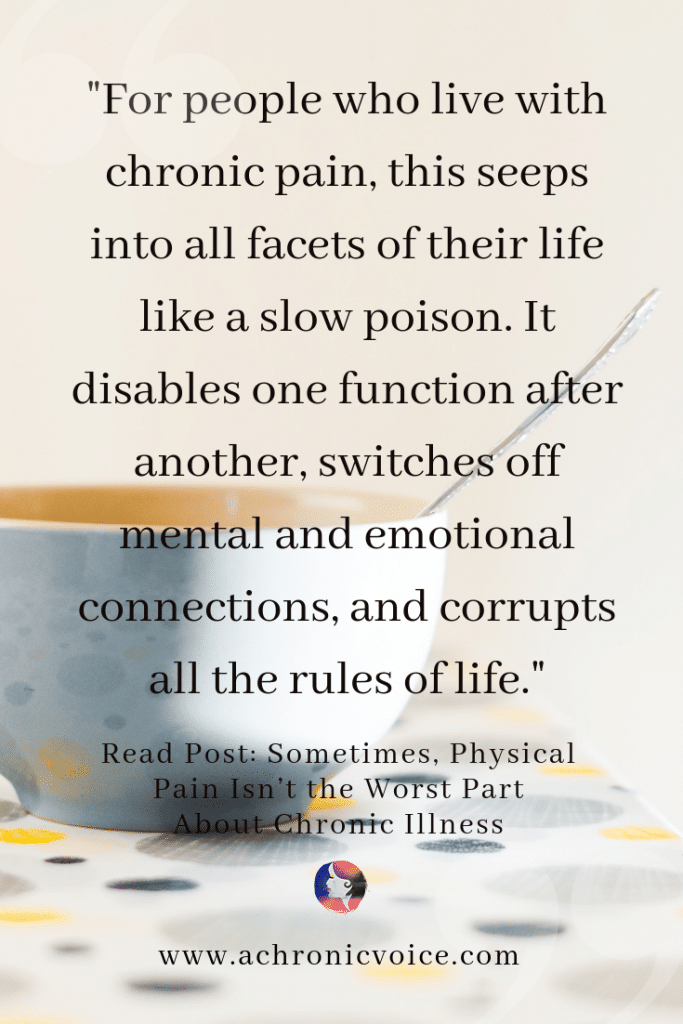
The Result of Endless Pain and Side Effects
There are endless symptoms when it comes to autoimmune and chronic illnesses. The drugs used to control them come with their own set of side effects as well.
Some of these side effects are so harsh that the patient is unable to continue using them. Or they may need another medication to control the side effects of the side effects. The irony.
It’s terrifying when your physical appearance morphs because of medication or illness. Looking at yourself in the mirror becomes a traumatic experience. It’s deflating and scary when you experience strange symptoms, ones that even your doctor has no answer for.
Here’s the Surprising Thing About Chronic Pain
I’ve lived with chronic illnesses for 20 years, and have gone through many, many pain flares. Flares that are so painful and disabling that I imagine this is what hell must feel like. Yet I actually don’t find this to be the worst aspect of living with chronic pain.
In my humble opinion, one cannot deal with chronic physical pain when they’re already defeated mentally. At that point, you’re too tired to even care anymore.
You don’t care about what others think about your ‘cowardice’ or rudeness. You don’t care that your friends and family might feel hurt or worried by your behaviour. It’s difficult to put this into words unless you’ve experienced it yourself.
Pin to Your Chronic Pain & Mental Health Boards:
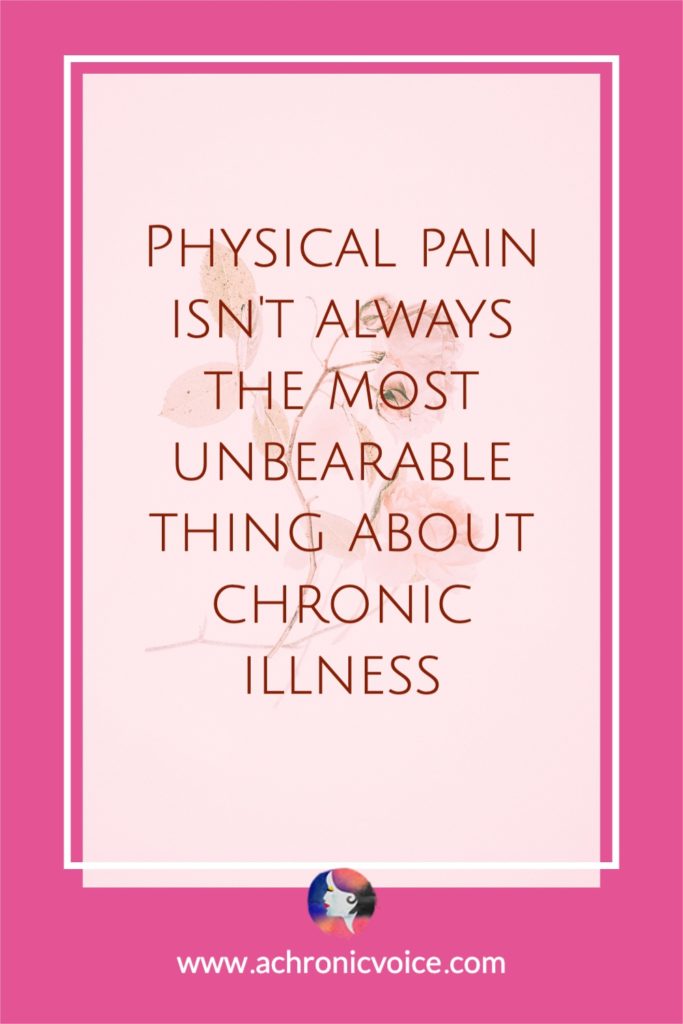
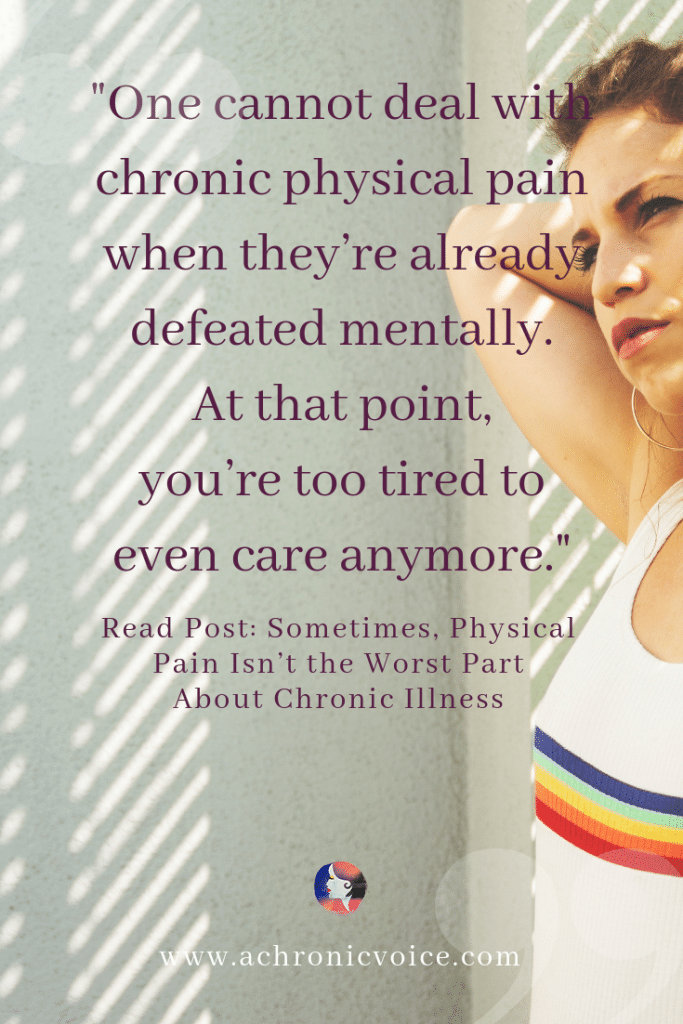
Over 40 Responses from Real Chronic Illness Patients
I ran a poll on Twitter some time back, on what patients found could be worse than physical pain itself:
Which part of living with chronic illness – unrelated to the the pain itself – gets you down the most?
— A Chronic Voice (@AChVoice) May 7, 2019
That’s 821 votes in total. Not all my polls have had such responsiveness, so obviously it struck a chord within the chronic illness community.
5 Recurring Themes in These Chronic Illness Patients’ Responses
This led me to take it one step further and go into a little more detail, as it’s clearly a topic that needs way more attention. There were a few recurring themes in the subsequent open-ended responses:
- The loss of friendships
- The ignorance or lack of understanding from friends, family and society
- Isolation and loss of a social life
- Loss of independence and career
- The unpredictability
Pin to Your Chronic Pain & Infographics Boards:
There are Many Ways to Show Support
How many times have you, as a friend or caregiver, felt helpless seeing your loved one in pain? I found these responses thought-provoking, because many of the situations can be helped.
Sure, no one can bear anyone else’s physical burden for them. But things like isolation and cognitive issues can be worked around with a bit of creativity. Know that simply being there for a loved one who’s suffering can mean the world to them.
Thank You to the Contributors Below
Thank you to each and every one of you who contributed, lended insight and dared to be vulnerable for a good purpose. I appreciate it, and know that it will be educational for many people out there. No matter what you’re going through or how you’re feeling, remember this: you are not alone. Hang in there x
*Note: Some of the responses have been edited for purposes of brevity or clarity.
What I Find Can be Worse Than Physical Pain:
“Isolation, loss of independence and people’s ignorance surrounding my illnesses.”
– Jo Moss –
“The emotional pain of feeling rejection. I always feel I am not enough. I feel I ‘should’ be holding down a job outside of the house. People who were close to me no longer are. The fatigue and emotions I battle with weigh in addition to my health struggles. I know that my family cares and that they want me t o feel better. But they don’t understand what I am feeling or going through as they aren’t experiencing it for themselves. I give them a lot of credit for trying, still some days I feel so alone and misunderstood.”
– Laurie Harmon –
“Not having a social life, losing my friends, feeling isolated and lonely. This has been difficult for me to accept and adjust to, going from a social animal to being completely isolated. People not understanding the effects of an invalidating chronic illness, to the point of not wanting to be around you, as they think it would have an effect on their ‘Happiness Bubble’. Feeling let down by the lack of understanding and care…too many things to list.”
– Mandy Vaccarezza –
“The people who have disappeared from my life. The resulting loneliness and isolation.”
– dSavannah –
“When my Short Bowel Syndrome flares, causing me to run to the bathroom every 10 minutes or less for hours on end.”
– Jenny –
“When I lost my job to chronic illness it hurt more than the physical pain of my rheumatoid arthritis. I lost a huge part of my identity when I lost my ability to work. It took a major toll on my mental health.
I worked so hard to get into my career field and to have my career cut short at age 27 was so painful. With time I’ve adjusted, but it will always feel like a part of me is missing. Thankfully I have my blog to focus on now and have found a new way to feel purpose. However, I’m not sure the pain of losing my career will ever really be completely gone.”
– Rachel Tait –
“People not believing I’m in pain.”
– Tonya –
spooniesthriving.com
“The isolation and loneliness. Sometimes it’s not even physical isolation but being in a roomful of people and feeling totally alone because of the pain. In an interview recently for disability benefits I was asked whether I saw many people or had visitors. I was really sad to say that I didn’t, which I found confronting. It made me aware how small my world has become because of chronic illness and pain.”
– Rhiann Johns –
“Being fat and not being able to use my brain to its full capacity!”
– Sophie –
“Being too weak and subject to injuries keeps me from joining in activities with family and friends. That is emotionally painful.”
– Carole Griffitts –
“For me, the alienation that chronic illness/pain causes is often worse than the physical pain itself. It’s difficult to be with someone, yet know that they don’t truly understand. I could be in a room full of 100 friends and still feel like I’m stranded and forgotten.”
– Jordyn C. –
“Brain fog and mental health problems.”
– Sarah Johnson –
“The unpredictability of it all. Living with chronic illness has caused me to view human connections in the same inconsistent way. Effects of my condition has made me unreliable. Therefore, I believe people will only show themselves to be untrustworthy and not constant in my life.”
– Janean Overman –
“My loss of concentration and cognitive abilities.”
– Amanda M –
“When questioned if the symptoms are just ‘part of life’, especially when it’s the people that are close to you.”
– Nick Winder –
“Knowing that my friends and family don’t really understand. They are kind, but they don’t know.”
– Gail C. –
“Multiple days in bed missing out on everything happening around me, especially time with my kids.”
– Erica Carrasco –
“I find the loneliness that I often experience is the most painful part of being chronically ill. I spend hours at a time alone while normal people attend work or school. I start to compare myself to others and I make myself sick (literally). I try to keep myself busy, and my brand and blog does just that.”
– Ashley B. –
“The psychological toll that the pain takes on most chronic illness patients including me.”
– Collin Wong –
“Payback. For everything I manage to do, even when I pace myself, there is payback. Even a week after being active, I might still be paying a price.
After years of learning to listen to what my body needs, I still want to do more than I’m capable of. The realisation that I can’t often hits me hard as if I am new to living with chronic pain. But I’ve been living with it for most of my life.”
– Elizabeth Sirrell –
“Having to let go of people who don’t understand, the ignorance you face from others, and not being able to physically do the things you did before.”
– Amanda –
“The constant fight to be recognised by doctors, family and friends as being disabled, and having the authority over my own body. Nobody knows me (or what helps) better than I do.”
– Beth –
“Having to live in poverty in order to get government assistance such as low income subsidy that is extra help for my meds, medicaid, food stamps and more. I wish that I could be a productive member of society.”
– Alex Flipse –
“The depression and anxiety along with the pain is hard to cope with.”
– Tammy Whitaker –
“Not being able to keep up with the pace of life – feeling so inconsistent. Feeling weak and useless.”
– Catherine –
“I’ve found that the feeling of missing out on life, not being well enough to be included in activities and events, and having to explain how I’m doing, can all hurt more than the physical pain. It takes a huge emotional toll to know that the only reason I can’t always go out is due to my body and chronic symptoms.
Friends don’t always understand my situation, which makes it even harder. I struggle to continuously express how I’m feeling to them because it changes over the course of each day.
Also, I simply don’t have as much energy or stamina as I used to. I’ll need my friends to understand that our hangouts will look different now, more laid-back and thoroughly planned out because of my new physical needs.”
– Jasmin Floyd –
“The unpredictability – can I do the thing or not, will the thing kill me or be super easy? Will this sneeze be a sneeze, or something akin to a surprise cameo of Green Arrow’s arrow through my right ovary? ?♀️”
– Bridget –
“Not being able to carry out normal, everyday tasks. Making me feel unaccomplished.”
– Laura Spoonie –
“The disconnect between what my brain wants to do, and what my body is capable of doing.”
– Elizabeth Bulfer –
“When people don’t take you seriously but belittle your illness and pain, dismissing them either as pretense, or as just a little something that’s ‘between the ears’.”
– Varpu –
“The voice in the back of your mind that nags at you at your best, and screams at you at your worst, telling you that you should be strong enough to overcome this, why aren’t you able to push past this, do more.
That voice telling you that you just might be wasting your only life, and that you are failing at everything. That vicious little voice that’s born out of ableism and societal pressure to ‘hustle’.
A voice made out of every single time someone close to you disregarded your illness or didn’t understand. The moments when this voice gets going feels more painful and more damaging than physical pain ever has.”
– Gwen –
thestrugglebabe.com
“Emotional pain of feeling alone, feeling like no one else really ‘gets’ it. Those that ‘get’ it are those that are in my online chronic illness groups.
I am sitting here in bad pain tonight and there are people around me, but I feel very alone and disconnected.”
– Laurie Ann Harmon –
“The feeling of aloneness when facing a period of disease flare with no foreseeable end can be mentally painful to bear.
It’s easy to feel like the (usually) healthy people around you can’t truly understand the sacrifices you’ve already made to the dreams in your life. And the potential sacrifices that come to mind when you realize that you may never fully recover, or that you may be on a path of lifelong decline in health.
It can be a very painful process to reimagine a new, more limited landscape than the life you had imagined for yourself. Often there’s a loss of freedom and independence.
The positive is that going through this painful process can open our eyes to the huge variation in what it means to be human, and to really believe that everyone deserves equal rights and opportunities.
In the case of invisible illness, it has helped me to view every person I interact with as an individual, and to wonder what burdens they bear, and how I can make their life easier and happier. This can be as simple as holding a door, or listening to someone vent their frustrations with a non-judgmental ear.
Turning the mental pain into something useful and positive is the best way for me to begin to heal, feel less alone, and like I’m living again.”
– Chronic_Denial –
Note: The article is based on each individual’s own experiences, and nothing should be taken as medical advice. Always be sure to check with your doctor before you start on any new treatment or protocol.
If you liked this article, sign up for our mailing list here so you don’t miss out on our latest posts! You will also receive an e-book full of uplifting messages, quotes and illustrations, as a token of appreciation!
Pin to Your Chronic Pain & Illness Boards:
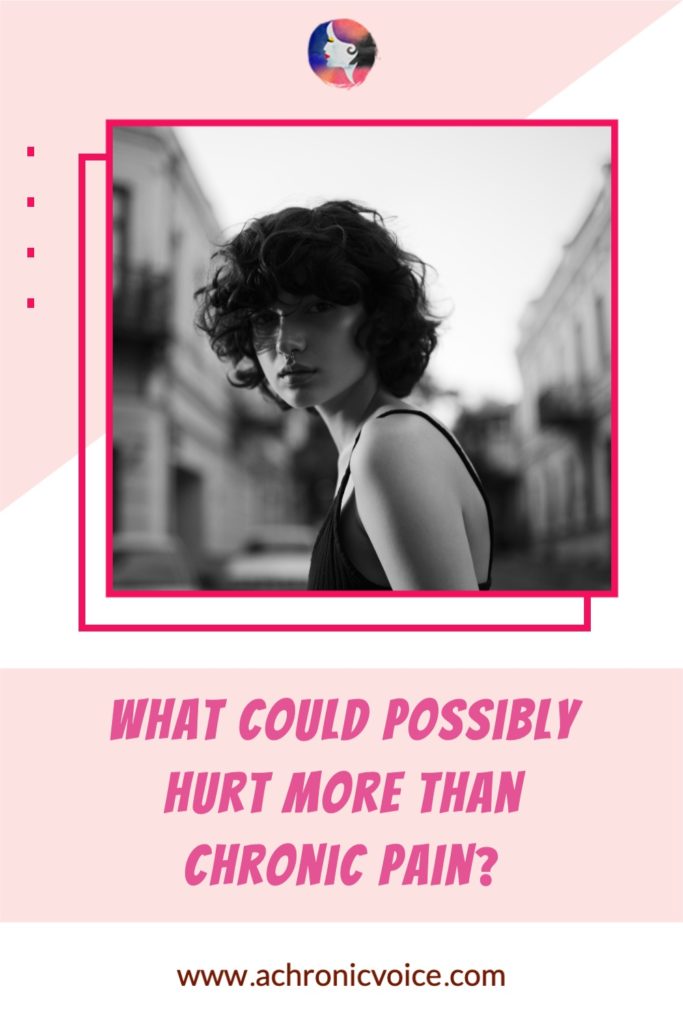
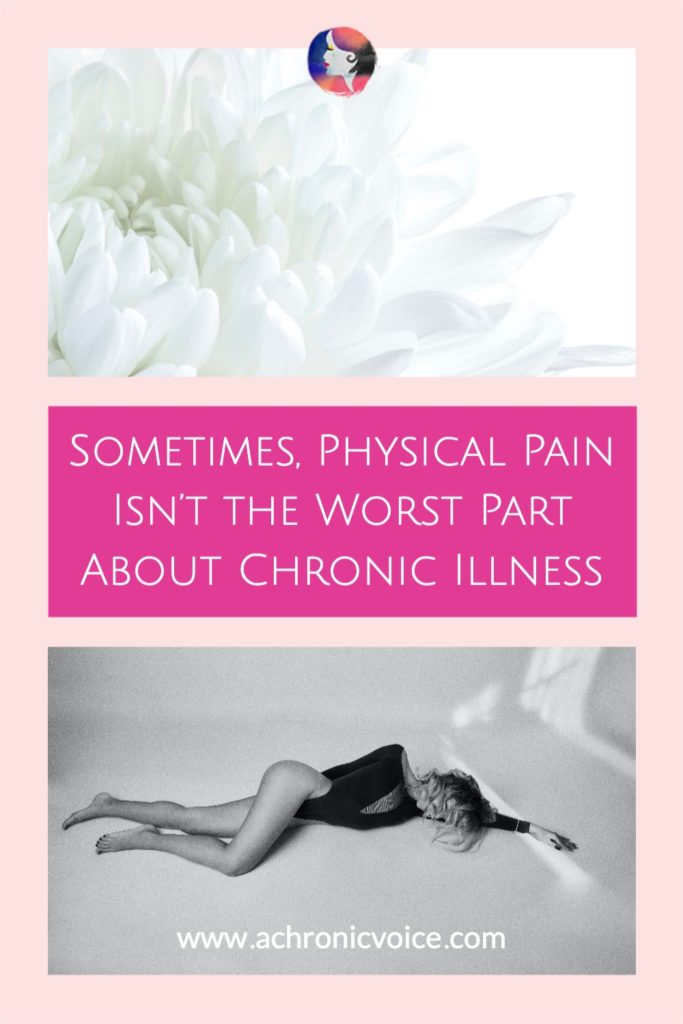
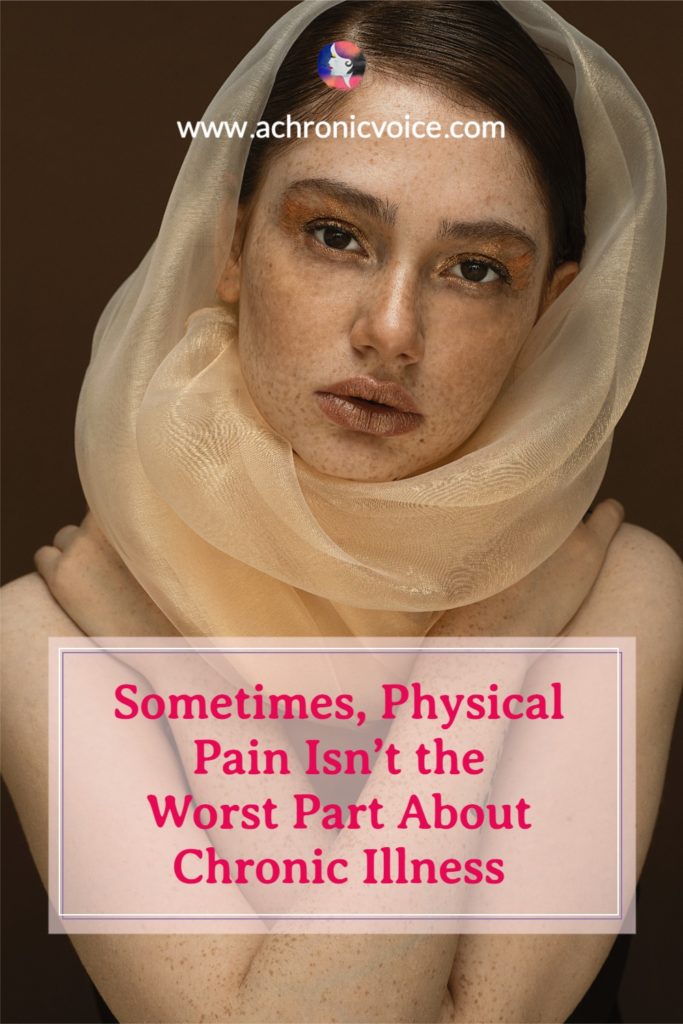
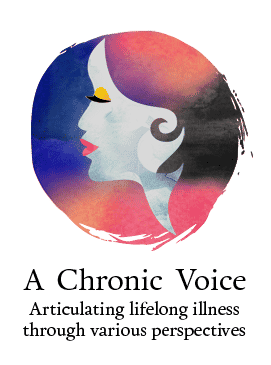
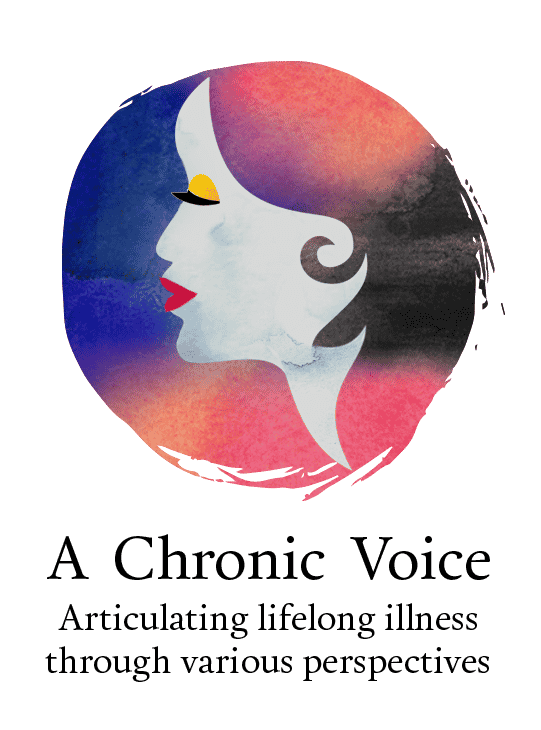
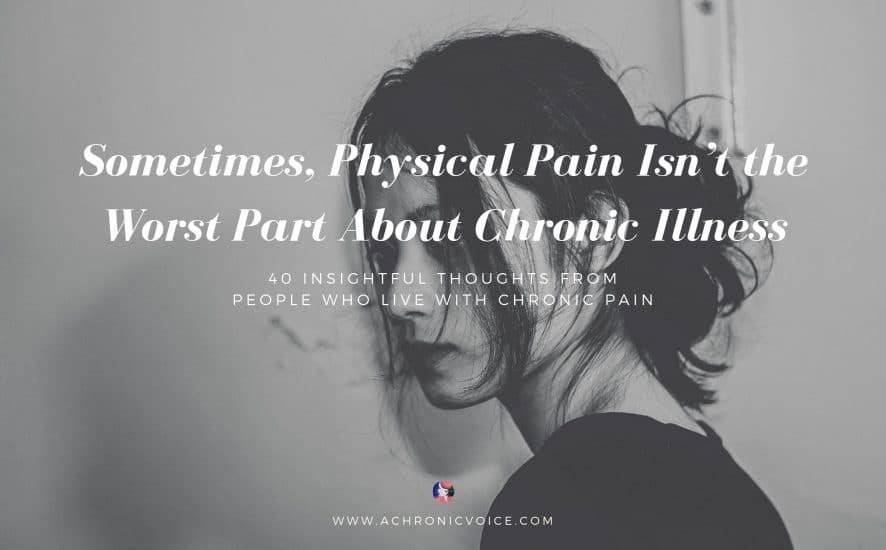
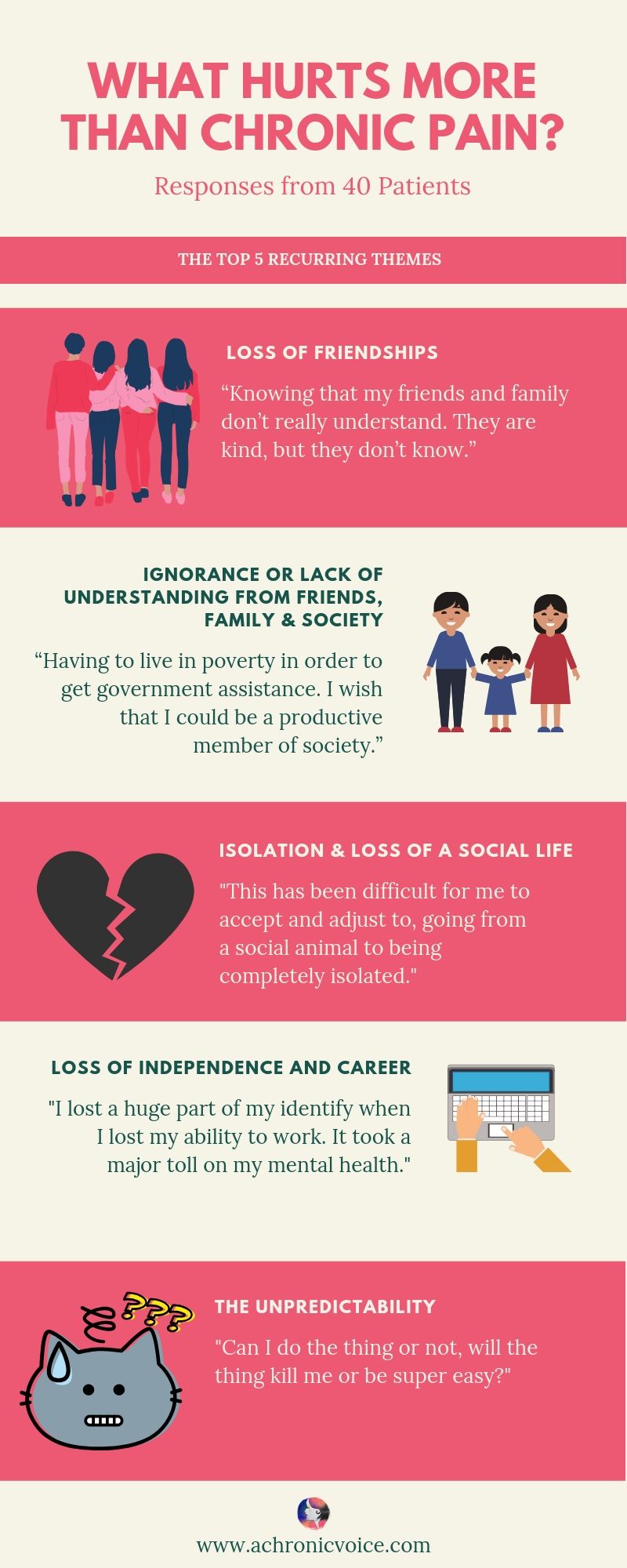
Excellent work on the polling and a wonderful summary, Sheryl! I think, for me, the worst parts are definitely lack of understanding from others and isolation. Still in that bad crash that began over a month ago, and the isolation is really starting to affect me!!
Thanks for speaking for all of us!
Sue
My Book: Finding a New Normal: Living Your Best Life with Chronic Illness
Yes I agree, especially if you’re extroverted and gain energy from these interactions. Isolation is bad though for anyone. Sometimes just a simple chat with a friend can really brighten one’s day 🙂 P.s. Would you like me to add your entry into the list? 😀
All the topics mentioned here by everyone is so true. It is so disheartening when people think that we’re making it up or just pretending to feel it. No one to help you and try the best you can to continue your day. Great topic, and so helpful! Sometimes I wish I can be normal and be like everyone, but it’s frustrating to know that I am not. It’s good to know that we’re not alone, and somebody somewhere understands our struggles.
Sending gentle hugs, April. It’s difficult to be undiagnosed like you are, as it can even lead us to question our own pain and selves. And people around us can be harsh. I hope you find answers to your pain soon.
Such an important topic! Physical pain is bad, but emotional pain lingers long after physical pain shifts. This is why meditation can be so important – to help you seperate the physical pain from the other components(like personal emotional expectations or fears around the pain) – but there’s not a lot you can do about how society treats you, except for try to help those around you understand or choose to only nurture friendships that are capable of respecting your pain or limitations. My FND hasn’t had major pain issues associated with it, and so far my migraines have mostly been managable – but from the glimpses I’ve had when things have gone bad, I have nothing but respect for folks managing chronic severe pain. I know how challenging I’ve found it when family or friends fail to understand my symptoms, or have assumed I’m ‘cured’ when I’ve had periods of improved control. It’s always got some aspect of struggle to it, and so often people just fail to understand!
Thanks for sharing your tips and thoughts, Alison 🙂 Yes I think it’s especially hard when friends and family dismiss your pain or don’t understand, especially when they’re the ones who are supposed to care the most, or who actually live with you. And the point made about society is spot on. More education and awareness are indeed necessary!
I find missing out on events and fun things with friends and family to be really hard. It’s somehow more disappointing and hurtful.
It can feel really depressing when you’re missing out on memories with loved ones, especially for the more extroverted ones of us.
Hi Sheryl… I was looking at the Twitter poll options and realised that I would find it hard to pick one. I really feel I’ve missed out being a happy teenager and social person in my 20s and now in my 30s I wonder how I would’ve been had I been able to keep a job, be social etc.
But after going through all that thinking I do feel quite happy that despite all the issues, life has been kind because I’ve managed to lose the people who didn’t care and have a more understanding set of friends. I’ve been blessed with family that is loving, helpful but lets me live too.
So yes I have missed out on a lot of stuff I would’ve loved to have done and yes it can hurt but thankfully somewhere I’m at peace with that.
Hi Shruti, I can totally relate to your sentiments. With the high dose of steroids I was on, I will never truly know which was puberty, and which was the steroids. But that’s okay, I’ve learned to let that go.
And I did write an article about what you mention too, regarding losing all the people who don’t matter, in case you wanted to read 😀 https://www.sicklessons.com/attract-best-people/
Thanks, once again, for another excellent resource article and round-up of chronic voices to attest to your topic. For me, the never-ending pain and exhausting that comes with it makes me feel very misunderstood. Sometimes I feel like no one in my family or inner circle of friends really get it. I know they read my articles and they’ve seen it, but there are times when I wonder if they really understand how my life is now. I can only keep trying my best to continue to inform them, but I’m pretty sure they got sick of reading my blog over 10 years ago! 🙂 It’s good to know we can look to other communities that DO understand us! I find solace in those groups.
Haha I hear you. I never force anyone to read my blogs though, and I think my ex never read it (but he lived it with me throughout). Surprisingly, I get other people reading it in stalker-ish mode lol. Yes, it’s good to have the community as a support network for sure 🙂 The pain and fatigue can get really depressing many a times.
A much needed post. I can’t imagine what you and others are going through. I think when you are physically and mentally not suffering chronic pain or pain period we take our bodies for granted. Also we have no idea what others are going through so compassion is needed on so many levels.
Thanks for taking the time to read and trying to empathise, Amelia. We need more people like you around 🙂 Whilst it’s true that it’s difficult to cope and impossible for others to understand, the best we can do is to try and convey it, and for the other party to try.
I read this post and the comments and it does seem like it is hard to get even close friends and family to understand…I have always said that if you haven’t got a plaster on your forehead then people think it is not as bad as all that or take a tablet or try to focus on something else … I suppose because you can’t see pain it makes it more difficult… I try so hard to understand and I am so aware that my understanding isn’t enough. A well written and thought-provoking post 🙂
Hi Carol, thank you for taking the time and heart to try and understand. It means the world to people with illnesses! Really it’s all about listening, and showing up for them. I hope you and your loved ones are in good health x
Hi Sheryl, the medications, the pain, the side effects pandas you have highlighted society all must make things so hard. The closest I know of this is my husband with chronic back pain, addicted to his pain killers. He has been on them about eight years or more, he suffers withdrawn and alot of pain with out them.
Very interesting post, addressing the issues.
Sorry no pandas… nor sure what I was writing there.. grrr to predictive text.
Haha I loved the pandas! :p And yes, it can be hard for others to understand though, because they don’t experience it. And I’m sorry to hear your husband is addicted to his pain pills…though I’d say there is a huge difference between addiction and dependence! Sending hugs.
Wow, you’ve really captured the thoughts of those who live with chronic pain and show what we all go through. It’s raw and heartbreaking to read some of these comments. Having lived with Chronic Pain for over half my life, I completely understand what everyone here is talking about. I still struggle with issues like being productive and making a difference.
thank you for talking about such a difficult topic. Your compassion came clearly through.
Thanks Pamela, and to all who dared to be vulnerable and share their insights. Yes it’s heartbreaking, and a topic that’s so easy to shove under the carpet when you’re not the one who’s suffering and weakened with pain.
Gteat article! It’s so helpful to know how others feel. So many of the comments sounds like I feel. Every day I go through the pain and loneliness of not doing what I did in the past. Adding 20 ugly pounds to my 5’1″ frame. Wondering about my quality of life for who knows how many years. Wondering if I’m a hypochondriac. The brain fog where I forget to pay bills. Losing friends and family. I hear myself whine and feeling guilty about it. Can’t work to make money and Soc Security barely covers expenses so can’t even afford CBD to see if it would help. Thanks for giving me a chance to try to explain.
Hi Donna, I think many of us experience many of these thoughts or feelings, unfortunately. It really does suck when it affects you physically and mentally, too, makes it so much harder to cope. You are definitely not alone. Hopefully this helps a little bit with highlighting some common and eternal human problems we have in society.
Those comments resonated deeply. Outwardly I appear normal and healthy, and generally I am. But I live with a rare genetic eye disorder. I was unable to claim government disability benefit because most health professionals have never heard of it. So I spent years commuting to a full-time office job, knowing full well on some days that my eye pain was so severe I could end up having a car accident. But I persevered through the dark days, and while I have now adapted my lifestyle to better accommodate my disorder, it is still very lonely.
Hi Catherine, it really is an issue when the condition is rare, plus not so visible. It really sucks to get support in such a scenario. It does get pretty lonely and I’ve found the online spoonie community to be a big support group. Which is lovely because they understand!
Thanks so much for raising awareness of this very important topic. Though my career felt like one of the hardest things to deal with losing, ultimately, it was more about the disapproval I felt radiating off of everyone that made it so hard for me to also be able to accept those changes. It’s the lack of support, friendship and camaraderie I missed the most, being forced into isolation was hard enough without the mass exodus of friendships and colleagues from my life who all felt that if I just had the initiative, I could keep going. Having people that “get it” in my life was very cathartic and helped me move forward. The reality is it takes very little to watch out and support our fellow human and that begins with belief, understanding and compassion for others. Whether we fully understand what they’re going through or not, it’s not difficult to accept that we don’t know and shouldn’t judge. Great post. Thank you!
Hi Michelle,
Thanks for sharing and for your support! Totally get what you mean. I wrote in another post about suicide about the same issues in society. I truly believe that with more empathy, many of those with chronic pain will be more inspired to carry on.
Very interesting post, and thanks for sharing. What really struck me was the poll results and how many people felt that societal expectations were one of the hardest aspects to deal with. It makes sense when you think about it, and is opening my eyes to what others are going through.
Hi Debra, thanks so much for taking the time to read these responses and for your empathy. Yes it really is difficult to deal with, there’s so much pressure within society even for healthy people, what more those with disabilities and illnesses. But we can make positive influences bit by bit in our own ways, too. Starting from the communities around us 🙂